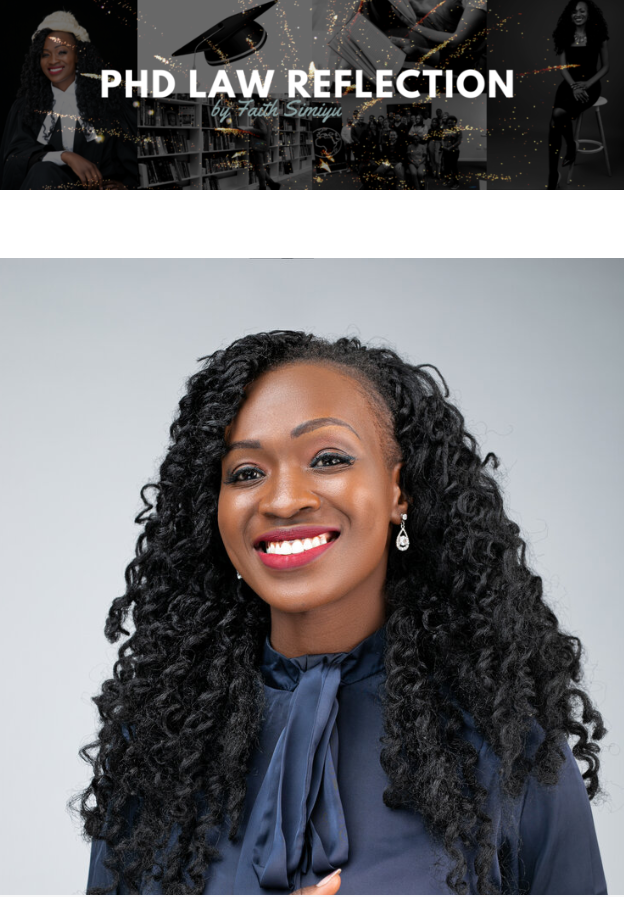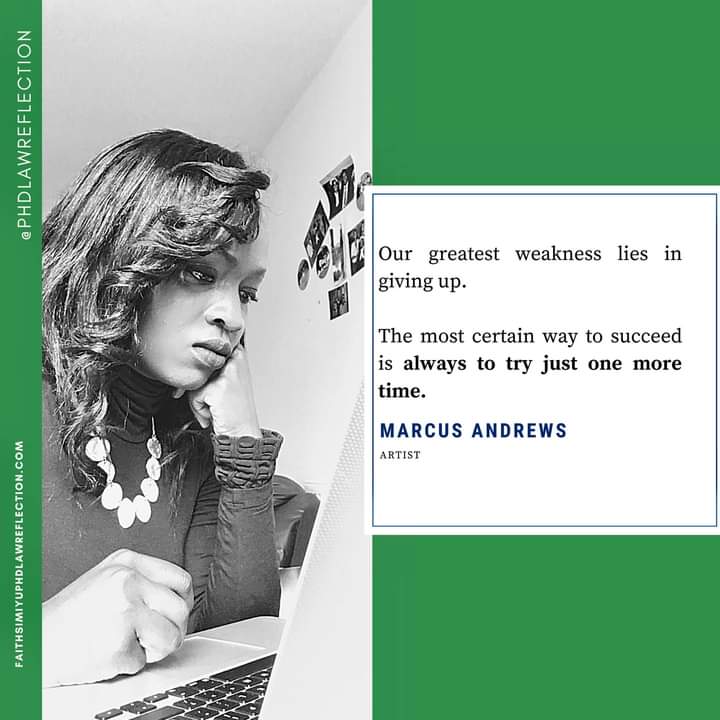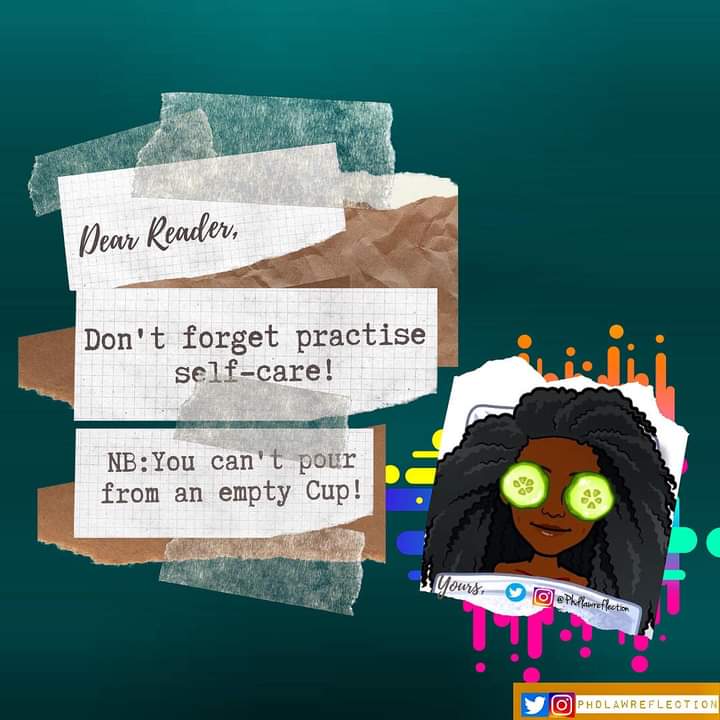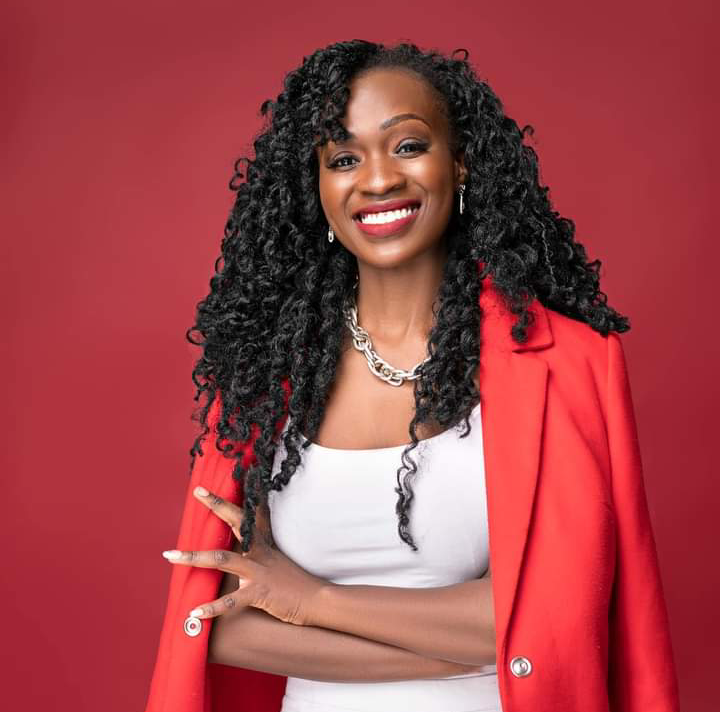Faith is the blogger behind phdlawreflection.com, a Barrister qualified to practise law in court and beyond, with a wealth of over eight (8) years litigation, legal consultancies and teaching experience; in Kenya and the United Kingdom (UK).
She has been privileged to serve as a Chairperson and law lecturer at a public university where she has taught and helped supervise thesis written by students at undergraduate and master’s level.
She is also a co-founding Partner in a medium sized law firm in-charge of court litigation and consultancies.
Currently, she has traded her court experiences with academia; pursuing a PhD in the UK.

In one of Faith’s blog post, she wrote “After over eight(8) years of legal practise and teaching experience and now doing a PhD; I still debate on whether doing postgrad is worth it! I sometimes wonder whether the returns will actually overtake the costs of investing in a postgrad.
Perhaps you have grappled with this dilemma? A dilemma often met by many graduates who are fresh from University, or mature would-be postgrads; who are already distinguished in their field!”
Faith’s reflections are receiving a lot of attention across Africa. To gain more insight into what she has been up to, Courtroom Mail posed some questions.
- Faith, beginning on a lighter note, we know about that essay writing competition held in Pelham Primary School, South Africa in 1998.You emerged among the top 10 winners and was awarded with a publication. Yes that could be a fun fact about you as you stated in your PhD Law reflections, but we are curious about the story of the cowboy and what informed it if you can remember. You were just 10, it could have been just about any other thing.
This is a good question. What informed me was the fact that I was reading many storybooks that had a Eurocentric approach & I wanted to add a voice from my background. I therefore decided to write something that echoes the stories that I heard growing up , from my grandmother as well as the memories developed when I would visit my rural home in Kenya. In my rural home there were many animals especially cows chickens as well as lush green grass which formed a suitable source of food. Whenever we would visit , grandma would beam with joy & give tales of her animals as well as other stories. This inspired me to do so.

2. In your PhD reflections, your vision is to empower and educate on what it means to pursue postgraduate legal education at Masters and PhD levels. That is very interesting but we will want to know what pursuing same means to you.
Pursuing a PhD has been life changing. Never has my zeal & determination been tested than when doing a PhD. It is not for the faint-hearted. On one hand, I have learnt to love working alone as you spend 8hours or more(on a good day) buried in research as the PhD is an isolating experience. In fact, research suggests that in the United Kingdom, the failure rate can exceed 40%. And in the United States, only 57% of doctoral students complete their PhD within 10 years.
On the other hand, I have had to learn how to navigate the different socio-cultural setting in the UK while maintaining my health & wellbeing. A setting that is largely impersonal(unlike Kenya), race & racism dynamics where in most cases you find yourself as the only black person in a conference or setting while staying true to yourself. It has also reinforced the hard & soft skills gained while working for over five(5) years as a legal practitioner e.g. the art of networking, client interviews & confidence in presenting at different fora all proved useful in the PhD setting. I have talked a lot about the PhD.

For Masters, the experience is not so different. I even mention this in one of the blogs. The difference is the duration. I did my Masters in Law in the Netherlands. Unlike the UK, I had to battle with the language barrier on top of the stress that comes with completing the Masters in one year. I actually took two years instead as I tried figure out my Thesis & battled with looses that had a negative impact on my progress. Doing a Masters is also a learning curve. If done abroad, the dynamics of different socio-cultural settings also come into play. It was a bitter-sweet experience as I met many incredible people from different countries who remain good friends to date. It’s also challenging as you attend classes everyday & then sit for exams. This was a challenge for me as I had been working for a while and so had not sat for exams in a long-time. Then comes the thesis- a most excruciating experience (comparable to sitting the bar exam or doing 1/2 a year of a PhD). The time & efforts spent is huge. I had no prior experience in writing a thesis so I had to start from scratch. I literally had to start learning what is research, research methods, methodology etc. I talk about this too(link).Overall, despite the challenges, I still enjoyed doing my Masters & PhD as i love reading!
3. You intend to disseminate important research on health & human rights. This part of your research aims at exposing policy gaps & injustice met by vulnerable & marginalized indigenous people. You have used the word indigenous repeatedly- Indigenous people, indigenous health problems-Within the context of your study, what exactly do you mean by Indigenous people as against “non-indigenous people” and why the focus on indigenous people when all classes of people suffer almost equally from policy gaps?
Very good question. I get asked about this a lot. In fact, many say that all Africans are “indigenous” so why have some group receiving special treatment. Most African governments also strongly hold these views and have resisted developing special policies aimed at protecting indigenous peoples. My answer to this is simple: historical injustices.
Indigenous Peoples of Africa(IPA) share a unique historical injustice which spans from colonial rule to present day. This one of their distinguishing characters where unlike “non-indigenous” peoples who have had their issues more or less addressed, the indigenous peoples have not. For example in Kenya, indigenous peoples still are marginalised when it comes to access to services such as education, health etc & participation in governance where they are worse off than the rest of the population by virtue of their indigenous status that includes a strong attachment to their lands where most live in rural or forested areas, are few in numbers hence do not even have one elected leader who can champion & safeguard their interests. This has been the case since colonial rule to date that some are labelled “barbaric & undeserving of tribal status” .
I would love to sit down and talk about the complex topic of what it means to be “indigenous” and “non-indigenous” as this is a convoluted term. I hope my small insights sheds some light albeit it being controversial.

4. The Ogiek Community case featured prominently in your study; it is about three years since a ruling was delivered in that case on the 26th of May 2017 upholding the rights of Ogiek community of Kenya over the Mau forest. The ruling was to the effect that Kenyan government had violated seven rights under the African Charter on Human and people’s rights. None of the rights bordered on health so why exactly do you think health issues should be discussed within the ambit of the Ogiek experience?
It might not be correct to completely rule out the “right” to health. While it might be true that the African Court did not directly rule that the Ogiek “right” to health had been violate it did touch on a few issues that fall within the ambit of the “right” to health including how their access to traditional medicines used for health purposes had been infringed. The health issues should be discussed as the Ogiek mentioned several “health problems” that were largely ignored by the Ogiek and partly perhaps due to how the whole litigation strategy was framed where the “health problems” were not explicitly pleaded as “right” to health violations. The health problems included lack of access to traditional medicines, which the court briefly touch on, as well as other factors such as rape, HIV/AIDs, pregnancy, inability to pay for medical care, fear of going to hospital in case they are met with the same violence that they did while being evicted etc; which were a direct & indirect consequences of land eviction. I actually did an interview with the Ogiek who were involved in the case as well as others and these issues arose once again and more including suicide, alcoholism, mental health issues etc. So, health is primal. It still needs to be discussed in any conversation seeking to resolve the Ogiek land issues, as ordered by court. Sadly, this was largely ignored & hence my research in the area. Even as the anniversary passed, the Ogiek were still being evicted and Government of Kenya(GoK) taskforce was trying to see how to implement the decision of the African Court.
5. Following up on what the pursuit of a PhD means to you, on the 16th of April 2020, you tweeted “Word! Ph.d has changed how I read, write & think; shifted from advocacy to academic language, is more CRITICAL (CAPS mine) discovered I’m a visual thinker….”
You also tweeted “Oh a different twist-I notice my writing is very different from if I’m to write court submissions. It might be considered a tad bit too academic or simplistic”
My understanding of the tweet is that your experience in the academia diminished your experience as a litigator/advocate. It elevated your experience as an academia as if your experience as a litigator/advocate is a child’s play. Will I be right if I continue to understand it that way?
Yes, well put. I no longer write my articles in the way I used to while in active legal practise. In fact, it is common knowledge amongst those in academia that ” if a 5year old can understand your PhD then you are good as done” meaning that the simpler the language the better it is understood & the clearer the message.
As a litigant, I would use what you would call “queens English” with many thou, bessech, may it please, be that as it is, hitherto, hereinbefore etc. I would write pages and pages of submissions on this too. My current writing skills have somewhat changed. In fact, while in 1st year of the PhD , my supervisors would remark how my writing was more like making court submissions but now it’s more academic. It would be interesting to see how this pans out when I resume legal practise. I suspect I might be writing shorter and simplified submissions. How it will be received will depend on courts.
6. In another tweet you said “A PhD is like shooting a movie alone& taking many turns before finding the perfect shot” Tell me more about this.
A PhD has many ups & downs. You write a lot. Read over 50 articles or more, only to use 1 or 2 of them & have many parts of your writing being discarded so you have to redo it over & over again until your supervisor tells you “You finally got it” and until your Viva committee gives you a nod. So yes, many twists & turns until the very end where you can hopefully find the perfect shot.

7. What influence do you intend to create in the minds of younger Kenyans and perhaps younger African students who follow your reflections.
Two interests are my goals in the PhDLawReflect:
- To inspire others to take the postgrad mantle at PhD or Masters level, as few dare to do so for fear or lack of knowledge on how to do so. In fact, there are less than 200 lawyers with a PhD in Kenya. Many are pursuing a Masters but not so much for PhDs.
- To offer tips for health & wellbeing while pursuing postgrad which can also apply to life & work
8. Now Faith, ending on a lighter note and laughing out loud, on your blog you embedded a tweet you retweeted, originally tweeted by a political studies PhD student at the University of Capetown known as Primrose Z.J Bimha saying “ When you begin sending stuff like “write now” instead of “right now” [Insert #Naija accent- *Because I’m always writing now]
Thanks to #Phdlife
Naija people think that either you are in love with the Naija accent or you are so much in love with the Naija accent that you had to retweet that post . One of the two or both. What have you to say? lol
Haha this is interesting oh(naija accent). I like the expressions in naija -very theatrical & lays emphasis in meaning only comparable to the Luo version in Kenya hence my tweets.

9. May we ask one final question we put to most people who on to Courtroom Mail; If you are given a S100,000 to donate to a cause,which cause will receive it?
For $100,000 to a cause hehe,i would have to say it goes to the legal aid for Ogiek community.Many really wanted me to take up their cases but i can only do so much.So far this means disseminating their stories but the money can go a long way in offsetting the legal fees as many sell the little they have to get bail,fight to get their grabbed land or wrongful & arbitrary arrests. Many are homeless & Legal fees exacerbates their situation to the point of suicide,mental health issues and chronic illness obtained while imprisoned
Click and have a look at the biggest online community of expert lawyers in Africa



